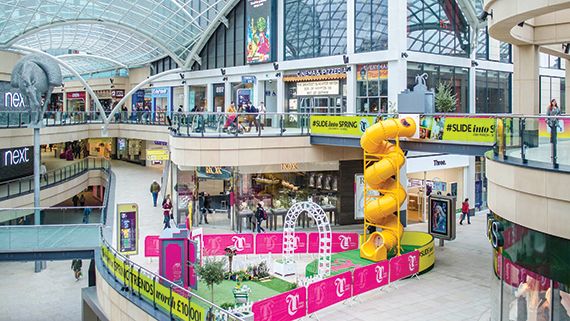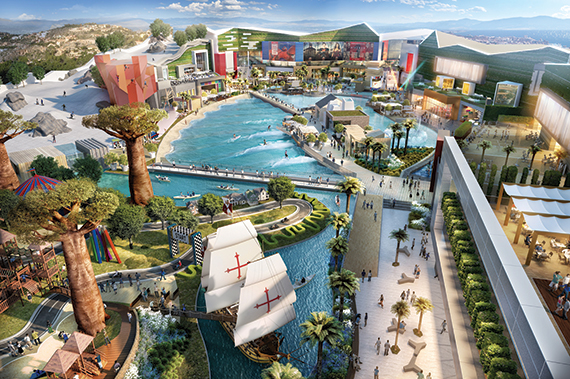 Just days after the UK launch of the Pokémon Go app, the augmented reality craze was affecting trade in shopping centres. Operators whose sites suddenly became virtual outposts were descended upon by hordes of monster hunters.
Just days after the UK launch of the Pokémon Go app, the augmented reality craze was affecting trade in shopping centres. Operators whose sites suddenly became virtual outposts were descended upon by hordes of monster hunters.
It may have been an unexpected boon for retailers – although operators can buy lures to help attract Pokémon – but it might also prove another innovative way to increase footfall as the battle continues with online.
Sponsored Pokémon locations may soon be introduced, but Davis Coffer Lyons director Kate Taylor says: “While the game itself could turn out to be a flash in the pan, there may be far-reaching implications for the technology it uses. Digital innovation is rightly high on the agenda of operators and landlords.”
In recent years, shopping centres have boosted their food and beverage offer to increase footfall and spend, with the proportion of F&B in shopping centres rising from 15% up to 40%, but it hasn’t stopped there.
“Finding alternatives is critical as centres explore a variety of new attractions to boost footfall,” says Lunson Mitchenall director Neil Hockin. “We’re seeing a massive move to capture the family market by offering a range of different formats.”
Appealing to a broader age range helps shopping centres compete for precious family time. Landlords are partnering with leisure operators to offer a full spectrum of activity-based attractions from bowling and golf to large-scale family entertainment centres. In 2015, Westfield teamed up with global brand KidZania to open a 75,000 sq ft child-sized city in Westfield London, while US entertainment giant Nickelodeon is to open a theme park at Essex shopping centre intu Lakeside (see box).
“We’ve got to offer something beyond what can be experienced online,” says Land Securities’ head of shopping centres Ailish Christian-West. “We’ve refocused the whole of our retail business to respond to consumer changes.”
 Alongside permanent tenants, leisure and entertainment is continually refreshed through temporary attractions. Recent offers from Land Securities include a summer football theme park at Bluewater, Kent, an indoor beach at Glasgow’s Buchanan Galleries and 22-foot long helter skelter at Trinity Leeds (pictured right).
Alongside permanent tenants, leisure and entertainment is continually refreshed through temporary attractions. Recent offers from Land Securities include a summer football theme park at Bluewater, Kent, an indoor beach at Glasgow’s Buchanan Galleries and 22-foot long helter skelter at Trinity Leeds (pictured right).
British Land is exploring the whole spectrum of attractions for its £300m Leisure Hall at Meadowhall. The 330,000 sq ft extension is due for completion in 2021, with more than a third of the space being taken up by leisure activities.
“You have to offer consumers an experience and we’ve done a lot of research into innovations in leisure to inform our plans,” says British Land’s food and beverage asset manager Alice Keown.
Ideas include a cinema, bowling alley, gym and kids’ zone. British Land is also considering a department store style physical activity centre. Keown says: “One operator would bring together between eight and 12 different activities under one roof which could incorporate the likes of a skate park, climbing, caving and scuba diving.”
The benefits of increased footfall and dwell time is already showing in the sales figures. When intu opened a 70,000 sq ft leisure extension at intu Potteries, Stoke-on-Trent, sales increased, with one retailer taking 30% more than in the same period the previous year.
“A number of brands such as H&M, JD Sports and Pandora have since taken space or upsized their stores as a result,” says Julian Wilkinson, asset management director at intu. “Overall, the leisure extension has generated £3.6m of new annual rent.”
Similarly, Hammerson’s Silverburn shopping centre in Glasgow saw dwell times increase by 14% and spend by 5% when its leisure extension opened last year.
But shopping centres need to be of a large enough scale to support major leisure attractions. Where does that leave smaller centres that can’t offer the same critical mass, and what other avenues can they explore to pull in the punters?
“They have to ensure they maximise the F&B offer where there is still scope for growth,” says CBRE’s head of UK and EMEA retail research, Andrew Phipps.
“They need to look at the commercialisation of non-traditional retail space and put on events to attract attention and keep people in the centre a bit longer.”
BMO REP manages shopping centres throughout the UK and Europe. Joanne Wilkes, head of in-town retail, says: “These days it’s about chasing dwell time as much as sales. It might be opening an indoor market in a vacant retail unit, hiring out empty space for dance classes, or providing space for people to work and have meetings.”
Centres also need to form closer ties with their local catchment, and Wilkes believes there is potential to provide community amenities, such as GP surgeries, dentists and libraries.
In the future, more shopping centres are likely to team up with major retail brands to provide experiential attractions.
Retail consultancy Shoppertainment Management works with shopping centres to maximise income and dwell time. Director Janet Monks says: “In our area of expertise, experiential marketing/brand events are becoming more and more popular.”
Recent events include a Monopoly bus that visited centres across the country, Pieroth Wines tasting sessions, and Sky giving shoppers the chance to sit on the iron throne featured in Game of Thrones.
Again, there is evidence of sales boosts as the result of hosting special events. For example, intu hosted a one-off student night across its portfolio.
“We received fantastic feedback from retailers, with one achieving 686% against their target and taking £20,000 in four hours,” says Wilkinson.
Pokémon Go might be just a craze, but savvy centres will embrace technology as a way of inspiring consumers. As well as using it to gain a greater understanding of customer behaviour and maximising the marketing potential of social media, developments such as augmented reality are already helping boost retail footfall.
The future of shopping centres may bring challenges, but those prepared to think innovatively will manage to adapt. BCSC’s Edward Cooke says: “Centres will have to be more agile, but people will still want to visit retail and leisure destinations. The successful centres will be those that adapt their offer to constantly changing consumer needs.”
Nickelodeon’s new family entertainment centre at intu Lakeside, Essex, will up the ante in the quest to integrate leisure with shopping.
Intu has signed a deal with Nickelodeon to open the 50,000 sq ft theme park, opening in 2018. The park will offer rides and activities based on popular children’s TV characters such as PAW Patrol and Dora the Explorer.
It will form part of the shopping centre’s £95m extension and will be one of a number of parks Nickelodeon plans to roll out across Europe with Spanish leisure park operator Parques Reunidos.
Intu’s director of development, Julie Pears, says: “It will provide a compelling customer experience attracting families from further and for longer.”
Intu’s plans are being informed by the success of its Spanish shopping centres, incorporating substantial leisure offers. Intu Costa del Sol opens in 2017 and will offer an ambitious leisure mix including a mini theme park, dry ski slope and man-made lake.
Pears says: “I see that model working here and we’re applying that experience to our UK sites.”
Whether the formula will be as successful in a country with a less favourable climate than Spain remains to be seen.
Jonathan De Mello, head of retail consultancy at Harper Dennis Hobbs, says: “FECs may have been around for some time but what they offer the UK market is far more relevant now when shopping centres are having to fight back against online retail.”
He adds: “The challenge will be ensuring they are not standalone destinations and that people will still be shopping. It will always work better when the leisure is interspersed throughout the scheme.”
 Family fun
Family fun
Nickelodeon’s new family entertainment centre at intu Lakeside, Essex, will up the ante in the quest to integrate leisure with shopping.
Intu has signed a deal with Nickelodeon to open the 50,000 sq ft theme park, opening in 2018. The park will offer rides and activities based on popular children’s TV characters such as PAW Patrol and Dora the Explorer.
It will form part of the shopping centre’s £95m extension and will be one of a number of parks Nickelodeon plans to roll out across Europe with Spanish leisure park operator Parques Reunidos.
Intu’s director of development, Julie Pears, says: “It will provide a compelling customer experience attracting families from further and for longer.”
Intu’s plans are being informed by the success of its Spanish shopping centres, incorporating substantial leisure offers. Intu Costa del Sol opens in 2017 and will offer an ambitious leisure mix including a mini theme park, dry ski slope and man-made lake.
Pears says: “I see that model working here and we’re applying that experience to our UK sites.”
Whether the formula will be as successful in a country with a less favourable climate than Spain remains to be seen.
Jonathan De Mello, head of retail consultancy at Harper Dennis Hobbs, says: “FECs may have been around for some time but what they offer the UK market is far more relevant now when shopping centres are having to fight back against online retail.”
He adds: “The challenge will be ensuring they are not standalone destinations and that people will still be shopping. It will always work better when the leisure is interspersed throughout the scheme.”











